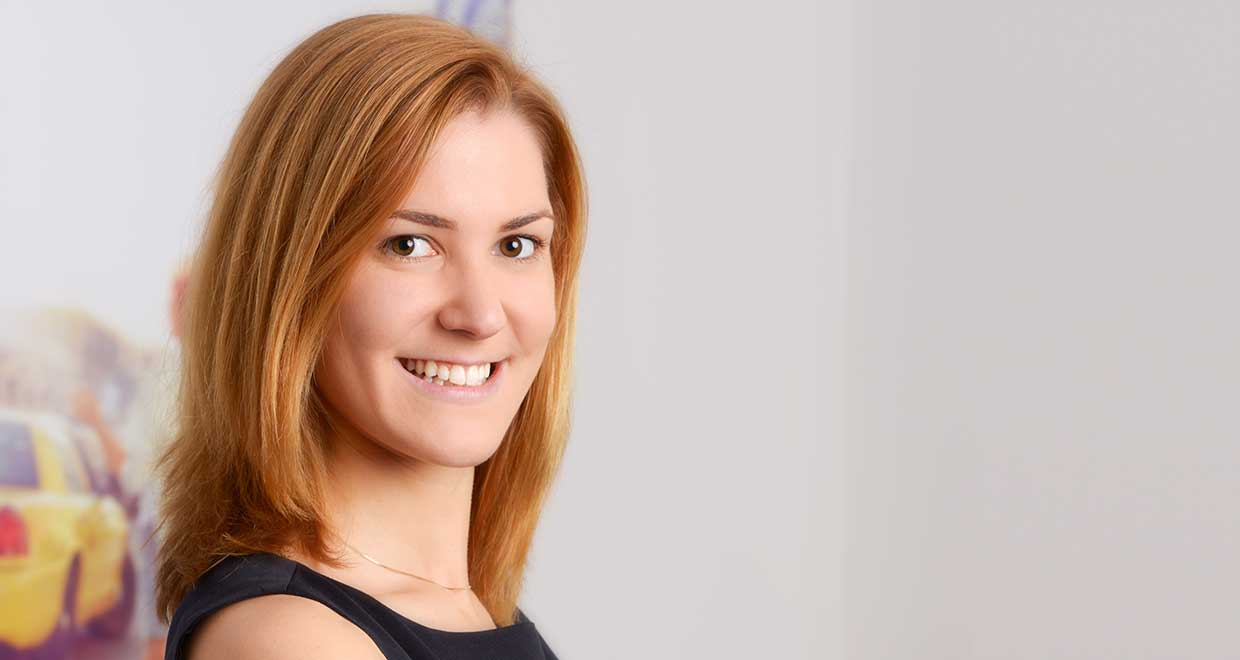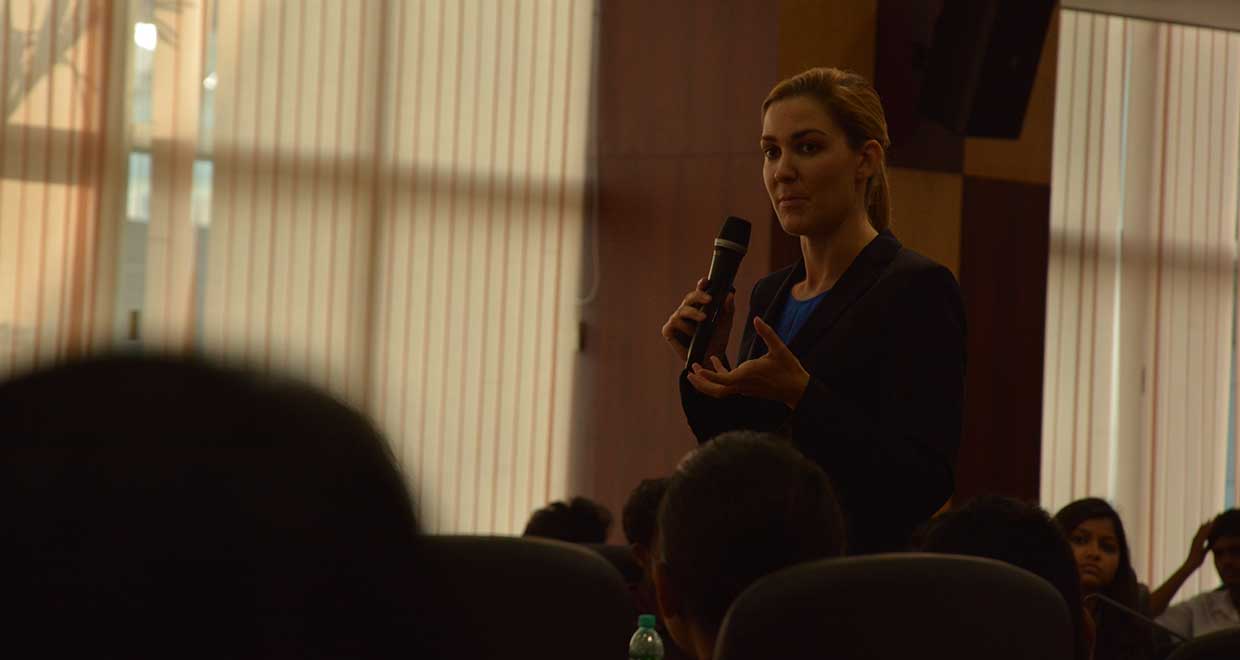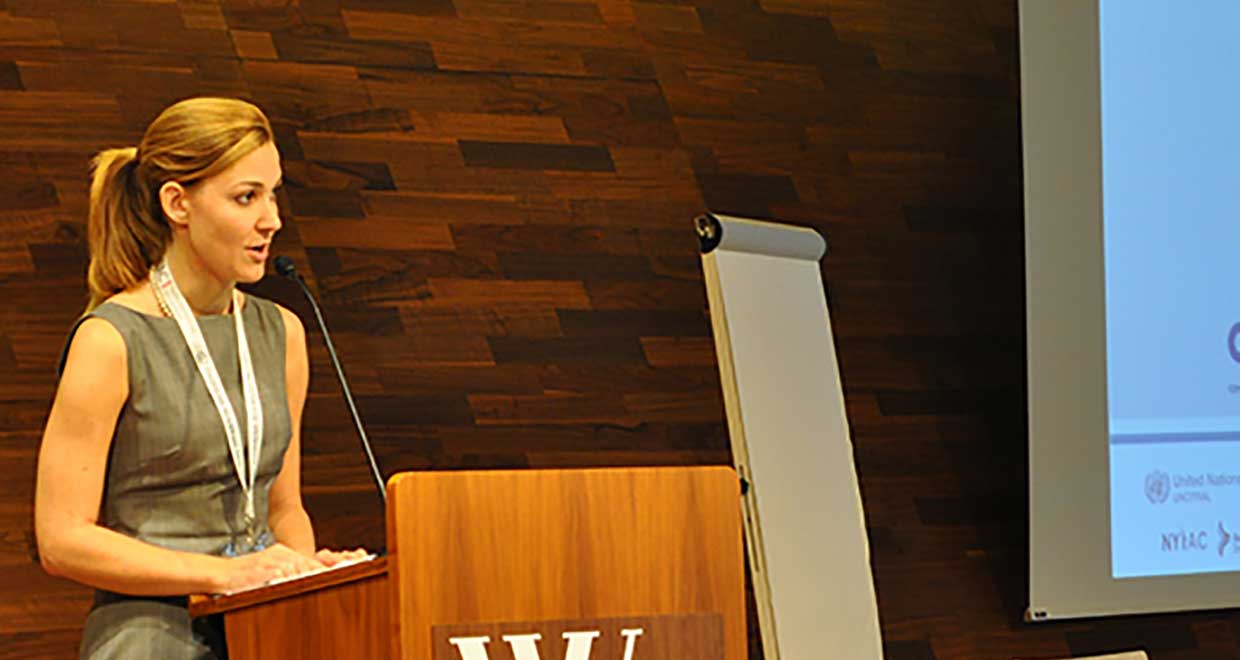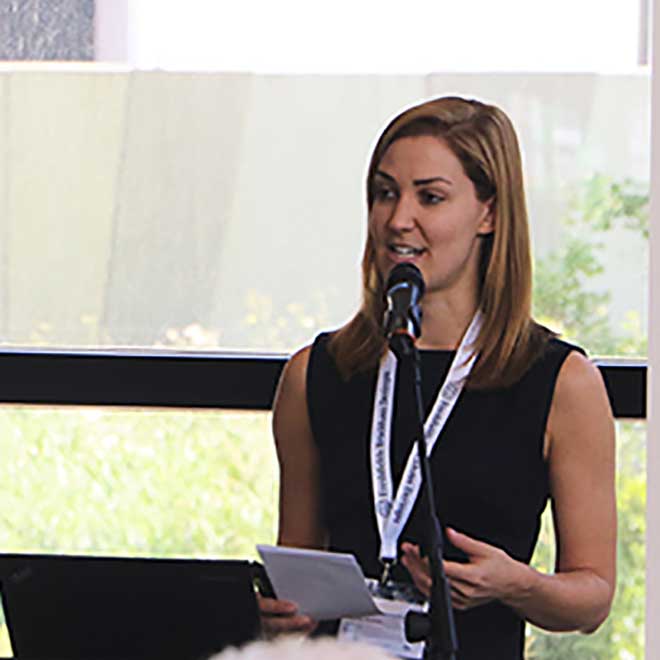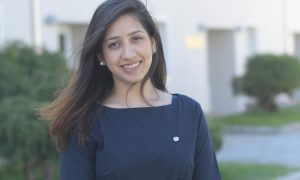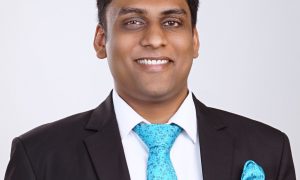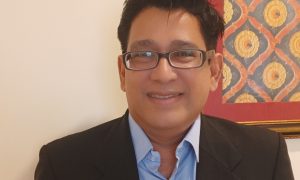Claudia Winkler is a negotiation and mediation trainer, the Director of the IBA-VIAC CDRC Vienna Mediation and Negotiation Competition and the General Counsel of SMART Recruiting Technologies. Claudia received her Master’s and Doctor’s degree in European and international law from the University of Linz and her LL.M. from Harvard Law School. Her professional experience reaches from law to government, non-for profit, start-up, university and international institutions. She has worked as the ADR development coordinator with the New York International Arbitration Center during her time as a Fulbright scholar and is a licensed Mediator in New York. As a trainer Claudia has worked with law firms, businesses, associations and universities in the United States, Europe, Africa, Asia and Australia. You can find out more about her work at www.claudiawinkler.net.
In this interview we speak to her about:
- How long term planning helped her to achieve big goals like a PhD, a Fulbright Scholarship and a degree from Harvard Law School
- How coffee meetings can be the best tip for your career advancement in ADR and
- How negotiation skills will determine your legal career in the 21st century.
How would you describe yourself in one line?
Hopeless optimist, careful strategist, curious explorist? Is that one line? If I could summarize myself in short I would describe myself as a negotiation enthusiast who stubbornly has set out to bring change to the way lawyers across the world resolve conflict, negotiate with their counterparts and work with their clients.
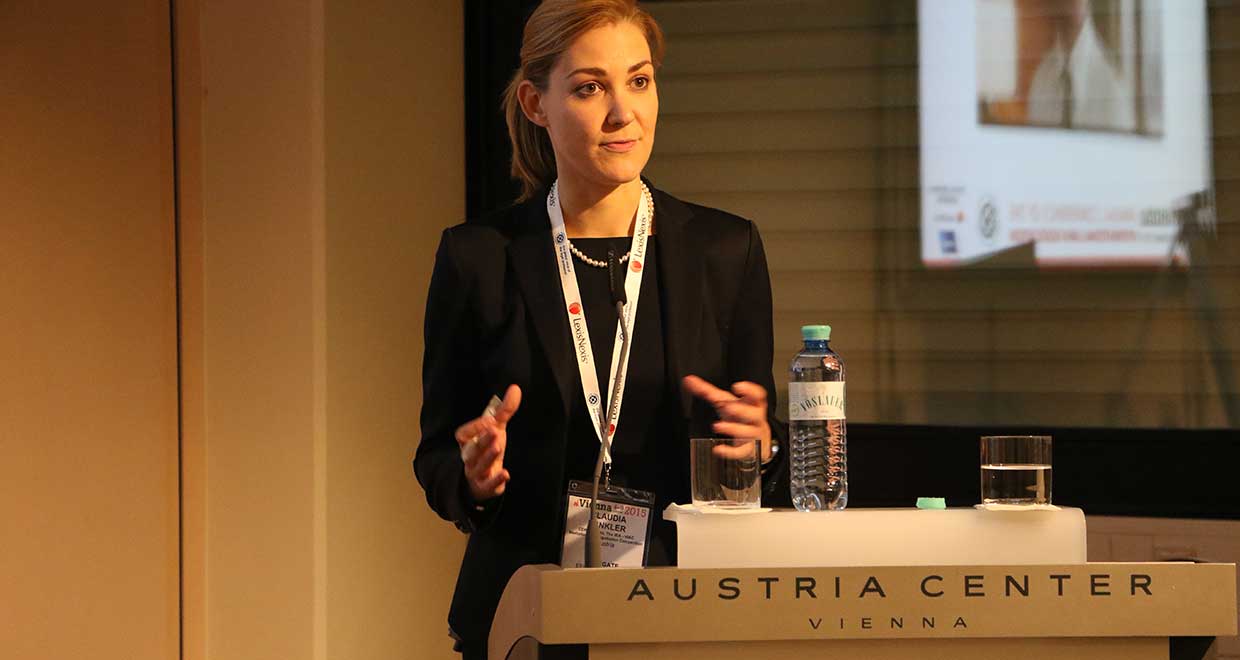
What motivated you to take up law?
I am a first-generation lawyer, coming from a family of wineries (which I hated when I was young but comes in pretty handy now that I enjoy their wine). At the age of fourteen, I started working internships with different law firms every summer and immediately became fascinated with the incredible tool law provides to make a difference in people’s lives. I decided at that age that I would study law and set to my mind that I had to make it into Harvard Law School.
How did you balance your academics with your co-curriculars?
(Claudia has graduated summa cum laude from both her Master and Doctorate at JKU, Linz.)
Haha, to be honest, when I didn’t study I either slept, ate or did sports. I was a nerd. But I never worked on weekends or holidays, and finished all my degrees below minimum time so I guess it was time efficiently spent without sacrificing any of my relationships and friendships.
Tell us what got you into negotiation training in the first place.
(As a negotiation trainer, Claudia has trained lawyers all over Europe, the US, Africa and Australia.)
After my semester with the negotiation program at Harvard Law School, which got me fascinated in negotiation, I moved to New York to spend my Fulbright time working with the New York International Arbitration Centre. Being in New York I quickly made friends with all the law schools there to audit and later guest lecture negotiation courses there. Every step of the way more and more resembled my passion for working with people, teaching and developing new skills. Once back in Europe I was convinced to have found my calling, quit my tenure tack offer and at the age of 27 set sail to navigate the negotiation oceans from thereon forth.
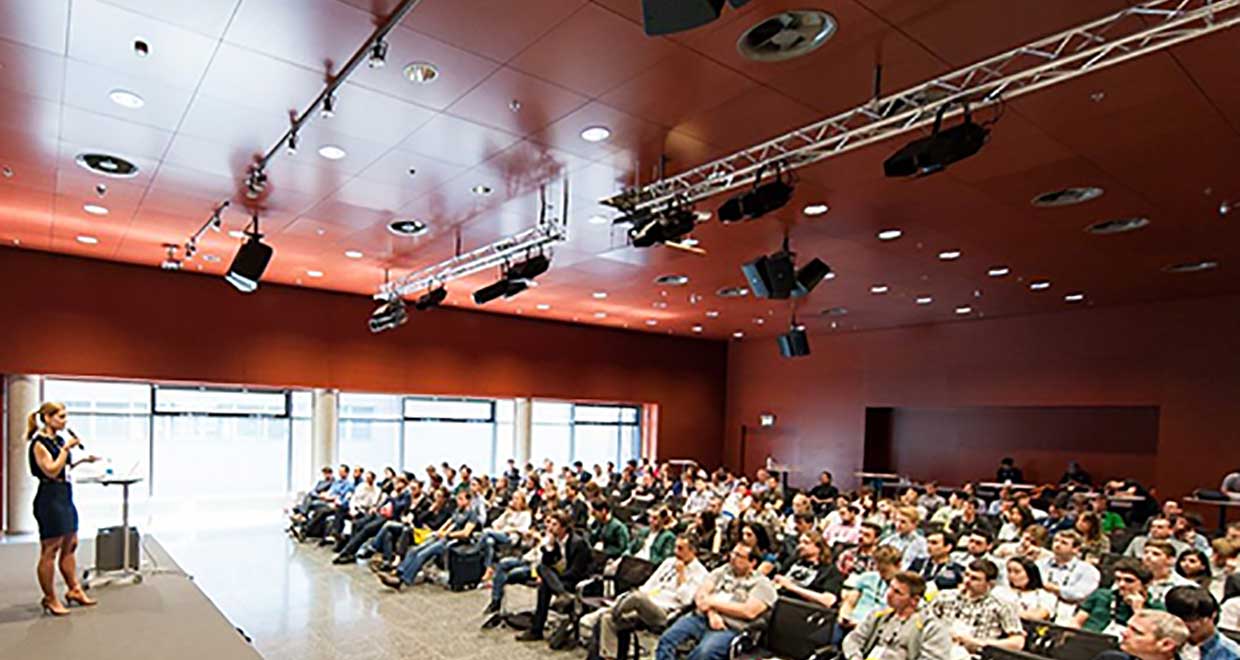
Could you tell us about the internships you took up, and what you learnt from those experiences?
I did a wide variety of internships, from big law firms to small law firms, national to international firms, international organizations like the EU Commission, to teaching English classes in Vietnam. I wanted to make sure to know what the various fields of work are like to be able to decide what I wanted to do by the time I graduate. My biggest learning was to see what environment I thrive in most and where I can apply my skills best. I believe that we can only be our best in fields we truly enjoy, so I used internships to search.
How does one secure prestigious scholarships?
(Claudia has received the prestigious Fulbright Scholarship and the Harvard Boas Scholarship in International Legal Studies.)
There is no magic formula but what certainly helped me was my long-term planning for excellent grades, diverse educations, early connections with great mentors and diverse extra-curriculars and work experiences. In my first year at law school I sought out the professor who also was a Fulbright scholar and Harvard alumna and started working with her wherever I could, including later for my doctorate. My entire studies I focused on gathering the right experiences, credits, credibilities and connections that would later help me achieve my goals. I believe that great visions paired with obsessive planning, great mentors and hard work lead to great success. The earlier you start to plan out our educational steps or career, the better you can work towards gathering the right “assets” that will eventually get you where you want to be.
Please share with us some of the learning experiences you have had during your LLM at Harvard.
There was a lot of personal development I took away from being surrounded by so many inspiring people there, many of which have remained close friends and have influenced me over many years after. It is an interesting paradox that, despite the many world- class legal courses, my personal biggest learning was that in the end better negotiation and communication skills give you leverage over better legal skills any time. The most successful lawyers don’t stand out because of what they know but because of HOW they use it.
What advice would you give students in avoiding a decision paralysis?
The best way to avoid decision paralysis is to do as many internships in as many different fields as you can. Once you see what various field are like it will be easier to find the right one. Even if you only know what you DON’T want to do, that’s already a great start. Keep being true to yourself and not doing what you found wasn’t the right thing for you.
In what ways can more awareness about ADR be brought about in countries with higher litigation numbers?
Building awareness for a new approach to resolving disputes requires time and needs to start from the next generation. While many senior advocates are well versed in applying alternative methods to resolve disputes, it will be up the generation that is graduating in the next years to bring the required mindset and awareness to elevate consensual dispute resolution mechanisms like mediation and negotiation to the level of “default go to” they need to become.
My personal focus in the last few months in India was to, with the help of the network of International Law Students (NILS), train hundreds of law students in Delhi, Mumbai, Chennai and Bangalore, ensuring that they have access to the core skills of negotiation and will approach Dispute Resolution from the right perspective right off the bat. I also spend much of my time providing negotiation trainings to partners and associates in law firms and major conferences like the International Bar Association, helping them to fine tune their negotiation skills and manage the shift to consensual dispute resolution. In this role I have trainer lawyers, judges, public defenders and entrepreneurs across Europe, the US, in Africa, Australia and Asia.
Can anyone learn to become a great negotiator?
YES! It is a common misconception that great negotiators are born. Some might be, but most are indeed made. Like any other skill, negotiation can be learned with the right framework, practice and feedback – for sure by an eager student who is truly interested in learning it.
How do you manage your time between your professional and personal interests?
As a self-employed professional I take my work everywhere so it gets difficult to put it away for too long. Over the years I had to learn to balance my ambition and professional goals with keeping a healthy amount of free time. The way I do this is setting fixed schedules and routines. I put personal matters in my calendar – anything that is not in the calendar it’s not happening. My partner and I go sport climbing and enjoy cooking sessions with friends, and yes, they are in the calendar too.
Why is it so important for lawyers nowadays to learn negotiation skills?
The time where law was about legal battles is over. The new paradigm in law is problem solving. Today’s lawyer has a new job description: cooperative problem solver, client interest focused adviser, business and law savvy partner to corporations.
Lawyers are hired just as much for their capabilities to overcome business hurdles for clients, skillfully grow business opportunities and quickly solve challenges as they are for their legal skills, which are considered a given. Negotiation skills are at the very core to all these requirements. Without fine tuned negotiation skills lawyers can simply not live up to today’s client expectations.
How is teaching negotiation in India different from other countries you have taught?
Negotiation is part of India’s DNA, it happens everywhere. As a result of the fierce competition between law firms and law graduates AND the vast backlog of cases in court negotiation skills are more crucial to any lawyer’s success than ever before. Within this newly emerging reality teaching law firms across India is particularly stimulating and rewarding – because lawyers here are aware of these major shifts and bring great curiosity, experience and excitement to my workshops.
What recommendation do you have for young lawyers that want to make it in the ADR, Mediation or the negotiation field?
It’s hard to start a purely Mediation or Negotiation related career right out of law school since there is no set career path and most of the (rare) jobs need a certain, age-connected, experience and credibility to become accessible. While you often can’t start with a job in this field you can do many things to get you there quickly. Go to trainings, attend conferences, shadow mediations, assist with trainings, publish papers, volunteer in mediation centers, join mediation organizations that have young mediator platforms and most of all continuously meet people that are working in the field. Make it a point to meet at least one interesting new person a week for coffee. Email people that you admire in your field, tell them what you are up to, share what you admire about them, and ask if they would be available to talk to you over coffee to share some of their career insights and learnings with you. You will be surprised how many people will actually write back and be happy to meet you. The learning and network is invaluable. You last sentence in every meeting should then always be “is there anyone that you think would be interesting for me to talk to?”.

